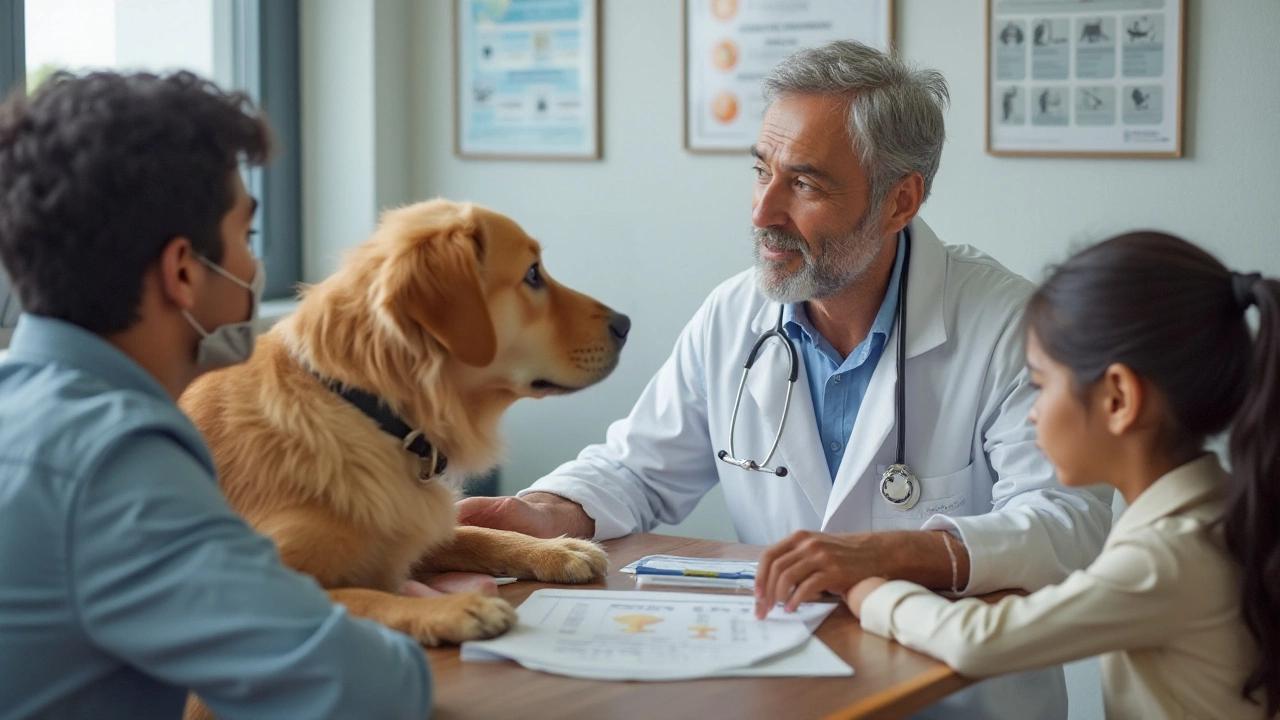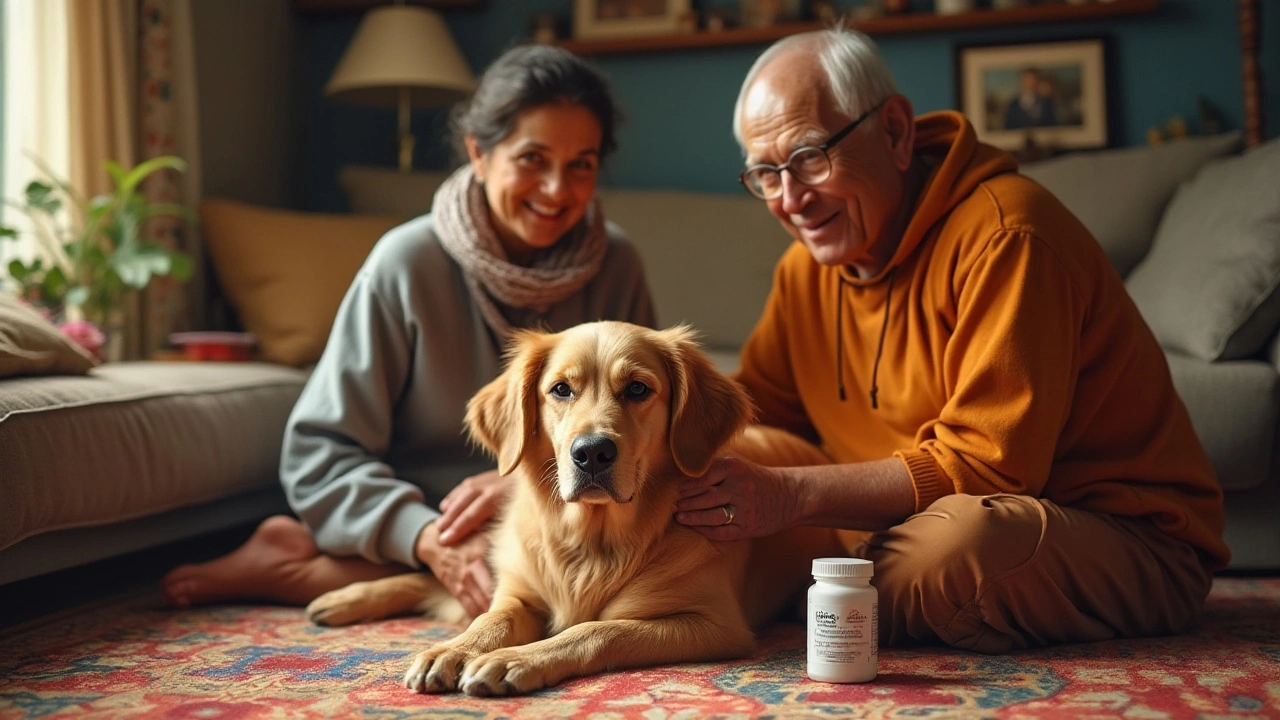
Keeping your furry friend healthy involves many responsibilities, and one essential aspect is ensuring they are appropriately vaccinated. Vaccinations protect dogs from various infectious diseases and contribute to longer, healthier lives. But when your dog reaches maturity, or perhaps even enters the senior stages of their life, you might find yourself wondering whether it's still necessary to maintain their vaccine schedule.
In this article, we'll explore the age-related considerations for vaccinating your dog. While puppies have specific requirements to build their immune defenses, adult and senior dogs have different needs that may change with age. It's not just about adhering to a standard schedule, but also understanding your dog's unique situation and health status.
We'll also delve into the types of vaccines your dog might receive throughout their life and the importance of regular consultations with your veterinarian. It’s all about creating a tailored healthcare plan that ensures your beloved pet stays healthy well into their golden years. So, let’s dive into the key factors to consider when deciding if or when to stop vaccinating your dog.
- Understanding Dog Vaccination
- Age and Vaccination Needs
- Special Considerations for Senior Dogs
- Consulting with Your Veterinarian
Understanding Dog Vaccination
Vaccination is a critical component in safeguarding your dog's health against a host of infectious diseases. Unlike the calls for yearly shots that once dominated veterinary advice, modern vaccination strategies often revolve around core and non-core vaccinations, each serving distinctive roles in pet health management. Core vaccines are generally recommended for all dogs due to the severe health risks the diseases pose and their widespread nature. These include vaccines against rabies, parvovirus, distemper, and adenovirus. Non-core vaccines, on the other hand, are given based on the dog's lifestyle, geographical location, and risk assessment, covering ailments like Lyme disease and kennel cough.
The concept of herd immunity plays a significant role here as well. By vaccinating individual dogs, we help control the spread of diseases across the population, thus protecting the broader canine community. The American Animal Hospital Association provides guidelines that emphasize the importance of determining the right balance of vaccines for each dog, considering factors like age and breed. Early life is crucial for vaccination since puppies need to build immunity against various pathogens. This often involves initial doses followed by boosters at specific intervals to ensure a robust immune response.
As dogs transition from youth to adulthood and eventually to senior stages, their vaccination needs may evolve. Some vaccines provide lifelong immunity after the initial series and boosters, while others might need periodic repeats. Experts generally recommend titers testing to check a dog's existing immunity levels, avoiding unnecessary vaccinations where possible. Engaging with your veterinarian is essential here, allowing you to tailor a vaccination plan that reflects your dog's health, environment, and exposure risks.
Dr. John Ellis, a leading expert in veterinary vaccines, once noted, 'Vaccination should never be seen as a one-size-fits-all approach; it's as much about protecting against excess as it is about safeguarding from disease.'
Each vaccine functions by stimulating the dog's immune system to recognize and attack pathogens if exposed later. This critical interaction underscores the vaccine's importance in disease prevention. The process is built on decades of scientific advancement in veterinary medicine, ensuring both safety and efficacy. Yet, awareness and understanding of vaccine schedules and types are vital for every dog owner, promoting proactive engagement in their pet's health journey. It's a commitment to both the well-being of your individual dog and the pet community at large. Regular check-ins with your vet ensure that the vaccination strategy adapts to your pet's unique needs, remaining a cornerstone of a lifetime of healthful companionship.

Age and Vaccination Needs
When you bring a puppy home, starting their vaccination schedule is a crucial step. Puppies, like human infants, have undeveloped immune systems, which makes them susceptible to diseases. Most puppies begin their initial course of vaccinations around six to eight weeks of age. This period is critical because, at this point, their maternal antibodies begin to decline. The puppy vaccination series typically continues every three to four weeks until they are about sixteen weeks old. This schedule ensures they receive comprehensive protection against common canine diseases like distemper, parvovirus, and rabies.
As your dog grows into adulthood, vaccination frequency tends to decrease. Most adult dogs will receive booster vaccines every one to three years depending on their specific lifestyle and the risks they might encounter. These booster vaccines are essential to maintain their immunity against diseases and are a part of an ongoing health maintenance plan. However, it's important to be aware that not all vaccines are created equal. Core vaccines are those recommended for all dogs, whereas non-core vaccines are given based on individual risk factors.
When your dog reaches senior status, typically around seven years of age, vaccination needs may change. Just like humans, older dogs have different health considerations. Some veterinary experts argue that senior dogs may not need vaccinations as frequently as their younger counterparts, depending on their health status and lifestyle. This is echoed by Dr. Karen Becker, a renowned integrative veterinarian, who states,
"As our dogs age, their immune function may not be as robust, and over-vaccination can pose undue stress on their system."Senior dogs' vaccination schedules should be tailored to their individual health status, the prevalence of diseases in their environment, and their lifestyles. Regular bloodwork and health check-ups can provide insights into how well their body is maintaining immunity over time.
To further underscore the varied vaccination needs throughout a dog's life, below is a sample chart that delineates potential vaccination timelines:
| Age Group | Vaccine Frequency |
|---|---|
| Puppies (6-16 weeks) | Every 3-4 weeks |
| Adult Dogs (1-7 years) | Every 1-3 years |
| Senior Dogs (7+ years) | Case-by-case basis |
As pet owners, we must remain informed about the best healthcare practices for our furry companions at every life stage. By understanding the vaccination needs at different ages, we can better contribute to our pets' overall well-being and ensure they lead long, healthy lives.

Special Considerations for Senior Dogs
As dogs enter their golden years, their health needs naturally evolve, necessitating adjustments in their care routines. One pivotal aspect that requires thoughtful attention is their vaccination protocol. For senior dogs, the balance between protection from infectious diseases and over-vaccination becomes crucial. With age, a dog's immune system can become less robust, which means that while they might not need the same vaccine frequency, remaining protected against certain diseases is still essential.
Determining the necessity of continued vaccinations should begin with a discussion about your dog's overall health and lifestyle. Factors such as chronic health conditions, existing immunity levels, exposure risks, and new emerging health issues all play a role. Dogs that have spent much of their lives indoors may have different vaccination needs than those who often interact with other animals or travel frequently. Thus, a one-size-fits-all approach doesn't apply. This holistic view helps in shaping a customized vaccination plan, aligned with the specific challenges and risks your dog might face.
Immune System Changes in Older Dogs
Veterans in veterinary science often advocate for antibody titer tests to assess a dog's immunity. Titer tests measure the level of specific antibodies in the blood and can indicate whether a booster shot is necessary. Considering these tests could help avoid unnecessary vaccinations while ensuring that your dog's health remains uncompromised. It's worth noting, "Older dogs may not respond to vaccines the same way they did when they were younger," states Dr. Karen Becker, a renowned veterinarian. This means regular health check-ups become even more critical.Special Vaccines and Considerations
For some older dogs, certain non-core vaccines might not be necessary. However, core vaccines like those for rabies and distemper might still be recommended due to the severe nature of these diseases. In cases where the dog's risk profile permits, veterinarians might suggest altering the frequency of such vaccines. Additionally, emerging health studies underscore the importance of heartworm preventatives in older pets, emphasizing the need to sustain a solid preventative care plan tailored to senior canine companions.Ultimately, the monitoring of your pet's health, response to vaccinations, and the guidance of your veterinarian will drive the best decisions regarding your dog's vaccine schedule. Remaining vigilant in watching for any adverse reactions post-vaccination, such as lethargy or appetite changes, is essential, promoting prompt attention should any issue arise. Decision-making at this stage should be a collaborative process between you and your trusted veterinarian, paving the path for a balanced and informed approach to the well-being of your cherished senior pet.

Consulting with Your Veterinarian
When it comes to managing your dog's vaccination schedule, your veterinarian is your greatest ally. These professionals have an in-depth understanding of vaccination protocols and can tailor their advice to your dog's unique circumstances. They consider factors such as breed, age, medical history, and lifestyle to make a comprehensive vaccination plan. Regular check-ups with your vet are crucial, not just to monitor your dog's ongoing health but also to assess any changes in their vaccination needs. Especially for senior dogs, these visits help determine whether they have developed any conditions that might affect their ability to handle certain vaccines.
During vet consultations, it’s essential to ask questions and express any concerns you have. Not all vaccines are necessary for every dog. Some, known as ‘core’ vaccines, protect against prevalent and severe diseases like rabies, distemper, and parvovirus. Others, dubbed 'non-core', might not be vital unless your pet is at risk due to specific living conditions or exposures. Staying informed about these differences can help you communicate more effectively with your vet about what's necessary for your own dog.
Many veterinarians follow the guidelines set by reputable sources like the American Animal Hospital Association (AAHA) or the World Small Animal Veterinary Association (WSAVA) when recommending vaccination schedules. According to the AAHA, “Protecting pets from infectious diseases through vaccination is largely responsible for the increased survival of pets from such diseases.”
“Vaccines, much like any medical intervention, require a tailored approach,” says Dr. Jane Smith, a renowned veterinary expert. “Each pet might have different needs depending on their health status and lifestyle, so we tailor their vaccination plan accordingly.”This underlines the importance of not considering vaccination as a one-size-fits-all solution.
For senior dogs, consulting with your veterinarian becomes even more pivotal. As dogs age, their immune systems and overall health can change dramatically. Some older dogs might still benefit from certain vaccines, especially if they remain very active or travel frequently. Others might be better served by having less frequent vaccinations or even ceasing them altogether. This decision often rests heavily on the presence of chronic diseases or reduced health in geriatric dogs. During these consultations, your vet might decide to run some tests to ensure your dog's health can handle immunizations.
Open dialogue with your vet also allows for reassessing previously administered vaccines. Vaccine titers, for instance, can measure the level of certain antibodies in your dog’s blood, aiding in the decision-making process regarding whether a booster is necessary. Pet health experts continuously debate the necessity and frequency of vaccinations, making your vet's role in interpreting and applying new research findings invaluable. This ensures that your dog’s vaccination regimen remains up-to-date with current veterinary practices.





